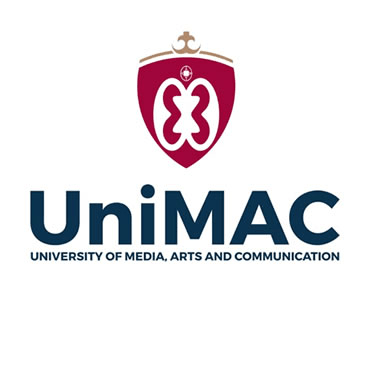University Of Media, Arts, and Communication (UniMAC), the newly established one-stop-shop specialized tertiary academic institution for the training of professionals in media, arts, and communication studies, promises to be a centre of excellence in the West African sub-region.
UniMAC, which is the first public university established by an Act of Parliament (Act 1059) that merges three specialized institutions comprising Africa’s premier journalism school, the Ghana Institute of Journalism (GIJ), Ghana Institute of Languages (GIL), and the National Film and Television Institute (NAFTI), seeks to provide premier comprehensive teaching and learning model in the ever-changing media communication industry, using leadership skills, best practices, research, and practical hands-on experiences.
The university is currently focused on the development of its fundamental statutes that would serve as guidelines for building synergy among the three merging institutions and implementation of its mandates, to become the most sort after communication school in the West African sub-region.

Acting Rector of UniMAC -GIJ, Prof. Eric Opoku Mensah, in an interview with the B&FT, shared a brief about UniMAC in focus, touching on the key initiatives that would take place to impact communication studies in the future.
He emphasized that with the structures being put together for UniMAC, the institution would be providing different opportunities that one cannot get anywhere else in the country and the sub-region. And so, the merger holds a great prospect for the future of media and art students in the country.
“UniMAC would become the one-stop-shop specialized university for the training of graduates in the arts, media, and communication studies and this would not be mere theory but highly practical, based on fourth industrial revolution skillsets.
So, all students will be gaining specialized training or skills from each of the three institutions and subsequently five when the other two are established to complete the initial idea,” he said.
Statutes Development
Though the law that made the merger possible was passed in 2020, the Interim Governing Council was only formed in December 2022, with the appointment of Prof. Kwamena Kwansah-Aidoo as the Vice-Chancellor.
Currently, the management team is in the process of developing statutes for the management of the university, which would provide the impetus for the administration of the university. Even though the statutes are not yet in place, UniMAC has started operations under the individual institutions’ existing statutes that would soon become defunct.
“It is a normal practice for academic works to begin whilst the statutory regulations are being developed to fine-tune the operations and, in our case, all three institutions already have some existing statutes which the governing council has agreed that it should be in use for now,” he said.
GIJ Under UniMAC
Prof. Mensah explained that with the commencement of this initiative, students of journalism in GIJ will not only graduate with skills in news writing or print and broadcast journalism but would also have hands-on experience in film-making and industry-standard television production, from NAFTI.
“Now if you look at the practice of journalism globally, the top players like CNN or BBC and the other big media establishments wouldn’t want to employ someone who can only report the news without a production background because during the COVID-19 pandemic, reporters were to do production from home or respective corresponding location and so that has become the focus going forward.
And GIJ as the leading institution for training journalists in Ghana and even West African sub-region when Nkrumah first established the institute, cannot be left out of championing skillset development in that perspective providing 21st-century media communication industry requirement,” the rector iterated.
This new focus, he said will provide new graduates of GIJ-UniMAC, multiple competent options when seeking employment in any communication or multimedia establishment the world over.
Similarly, Public Relations and Marketing students as well as Journalism students of GIJ would also gain bilingual skills due to the presence of the Ghana Institute of Languages (GIL) in the conglomerate.
“With the GIL offering professional courses in several languages including French, Spanish, Chinese, and Arabic, among others, GIJ graduates might end up being bilingual graduates which would also enhance their opportunities for each international jobs either in Europe, Asia, or Middle East, depending on the option of language one decides to learn,” he added.
The rector stressed that with this merger, GIJ does not necessarily need to invest more in building strength or competence in film production anymore but build strong synergy with NAFTI to make it easy for students of GIJ to learn film-making and vice versa.
Giving his perspective on the feasibility of these initiatives, the rector mentioned that the statutes currently under development would provide the road map for the implementation of these ideas.
However, he indicated that a situation where a student of GIJ for instance would end up spending a full semester in NAFTI and another on GIL campuses before the completion of the four-year Programme of study is likely to be the outcome.
Identity Change
Prof. Mensah indicated that the governing council has agreed that GIJ would be the host administrative Centre for UniMAC for now, and there is a discussion for each institute to maintain its distinctive traditional identity under the merger.
So, NAFTI, GIJ, and GIL would all not have a complete change of name but an attachment of UniMAC to the existing name so that the traditional identity is not lost. For instance, UniMAC GIJ Campus, UniMAC GIL Campus, and UniMAC NAFTI Campus would become the common reference points when referring to any of the three institutes.
Nonetheless, students of UniMAC would have the freedom depending on the programme they are offering to move between campuses with limited restrictions.
Two Pending Institutions
The Act establishing UniMAC, (Act 1059) stipulates that two more new institutions are to be established and added to the conglomerate for a complete merger.
These two unborn academic institutions are the Institute of Digital Media (IDM) and the Institute of Theatre Studies (ITS).
The creation of these two new institutes which is yet to be announced would further broaden the comprehensive approach to teaching and learning at the institute and the quality of skills and competencies graduates from UniMAC would bring to the media and communication industry.
The academic, Industry disconnects
The rector of GIJ maintained that the constant criticism of academia for not producing well-refined talents for the industry has been overemphasized. He indicated that it is not entirely true that there is a disconnect because those who are currently in the industry making similar comments went through the same system and are able to rise to their level of competence now, hence a need to change that perception.
However, he mentioned that because of constant changes in technological advancement and ways of doing things, there is a need for academia to constantly upgrade to meet market demands and new trends, hence the management of GIJ under his leadership is putting together strategies that will enable the involvement of captains of industry in academic activities to provide mentorship and coaching resources to students.
“If you look at academic practice years ago when these well-established leaders of industry were in school and now, things haven’t changed much, and the changes that have happened rather improved the teaching and learning process facilitated by technology and so we have to change this mindset and rather support the development of talents in young graduates,” he said.
He added, however, that all the boards have key industry players as members who will provide leadership and advice in developing curriculums with an industry focus.
Again, the institute is setting up an attachment office to widen the scope of attachment opportunities within the industry and ensure proper mainstreaming of attachment programmes to be able to monitor progress and improve upon the shortfalls.
“Industry also has a responsibility to contribute to academic development and strengthening of institutions to produce best to for the industry, so it is a shared responsibility,” he said.
He urged the industry to open up and be willing to accept students for internship and work opportunities to aid in their full development
Upcoming Programmes
BA Journalism, Sports, Economics, and Politics, BA Development Communication, MA/MPhil Political Communication Management.










